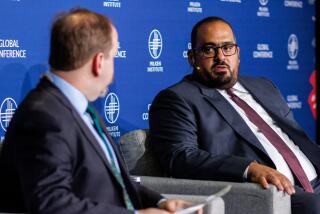Saudi Investors’ Right to Sue in Fraud Case Upheld : Ruling: An appellate court says racketeering allegations can be brought because the actions at issue took place in the U.S. A Lincoln S&L; unit is involved.
- Share via
A federal appeals court in New York, in a case involving failed Lincoln Savings & Loan, ruled that a group of Saudi Arabian investors can press a racketeering and securities fraud case in this country against foreign banks and U.S. citizens.
An attorney for the investors said the ruling, issued late Wednesday, could broaden the application of U.S. racketeering and securities laws to international schemes against foreign victims.
The suit had been dismissed by a lower court, which ruled that it did not have jurisdiction over alleged fraud occurring outside the United States. The U.S. 2nd Circuit Court of Appeals, however, decided that the lower court can hear the case because the plaintiffs allege that the fraud took place in this country.
“This decision will significantly broaden the application of federal racketeering and securities fraud laws to international schemes against foreign victims,” said Jeffrey Parsons, one of the Houston attorneys representing the Saudi investors.
The case involves the issuance of new stock seven years ago by Saudi European Investment Corp., a Netherlands Antilles company that owns Saudi European Bank in Paris, to firms such as a Lincoln subsidiary in the Netherlands Antilles.
Both the Saudi investors and the Resolution Trust Corp., which is liquidating Irvine-based Lincoln, have sued SEIC, its banking unit and others, accusing them of fraud in issuing the stock and in diverting some proceeds to personal uses. Lincoln and its former owners and operators are not named as defendants in either suit.
The investors’ suit alleges that--because the prospectus stated that SEIC shares cannot be offered in the United States--Lincoln’s chief owner, Charles H. Keating Jr., tried to structure the sale offshore to avoid U.S. jurisdiction.
He created a Netherlands Antilles shell company--Lincoln American Investments--to buy the shares, but the appeals court held that the suit is viable because the transaction was negotiated in the United States before the stock sale.
The Resolution Trust Corp. alleges that SEIC and its owners and operators schemed to defraud Lincoln of $18 million seven years ago. The agency asserts that Keating found out about the alleged fraud a year later but agreed with some of the 10 defendants to keep the information secret.
Part of Lincoln’s investment was among at least $40 million that Saudi European Investment diverted from its oversubscribed stock offering, the suit contends. Some of that extra money, the suit alleges, was used by certain SEIC operators and favored shareholders for U.S. investments.
Keating, who was chairman of Lincoln’s parent company, American Continental Corp. in Phoenix, also became a Saudi European Bank director. American Continental bought Lincoln in 1984.
Regulators have long questioned Lincoln’s investment in SEIC. In two real estate deals with Saudi European Bank, for instance, Lincoln booked $9 million in phony profits, regulators have alleged.
In a $2.7-billion racketeering suit against Keating and others, the Resolution Trust Corp. contends that the profits generated by deals with Saudi European Bank were among nearly $95 million of earnings that Lincoln wrongly paid to American Continental as part of its share of corporate taxes. That suit, filed in federal court in Phoenix, alleges that Lincoln made the payments even though it owed no taxes.
More to Read
Inside the business of entertainment
The Wide Shot brings you news, analysis and insights on everything from streaming wars to production — and what it all means for the future.
You may occasionally receive promotional content from the Los Angeles Times.










